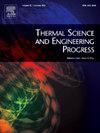麦克斯韦型三元纳米流体在带滑移和热效应的拉伸/收缩薄片上流动的双溶液热力学不可逆性和稳定性
IF 5.4
3区 工程技术
Q2 ENERGY & FUELS
引用次数: 0
摘要
在涉及复杂流体和热传递的工业系统中,诸如能量损失、热效率低下和不稳定的流动行为等挑战通常会限制性能。本研究研究了麦克斯韦三元纳米流体在拉伸/收缩薄片上流动时的熵生成和对偶溶液的稳定性,包括速度滑移、温度跳变和热源/汇。在MATLAB中利用bvp4c方法求解控制方程。结果表明,在λ= - 1.5时,三元混合纳米流体(THNF)的热效率比二元和单一纳米流体分别提高0.22%和0.28%。随着吸力、速度滑移和弹性的增大,传热和表面摩擦力增大,而熵产随着K和滑移的增大而减小。第一种溶液是稳定的,而第二种溶液是不稳定的,在物理上是不可接受的。为了改善传热和减少阻力,有效的策略包括使用THNF、增强吸力、优化δ和K、增加吸热(H)以及将温度跳变设置为0.2和0.8。其新颖之处在于首次全面研究了复杂边界效应下麦克斯韦型THNF流的熵产和稳定性。这些发现为能源、电子和先进制造业中高效、低损耗热系统的设计提供了信息。本文章由计算机程序翻译,如有差异,请以英文原文为准。
Thermodynamic irreversibility and stability of dual solutions in Maxwell-type ternary nanofluid flow over a stretching/shrinking sheet with slip and heat effects
In industrial systems involving complex fluids and heat transfer, challenges such as energy loss, thermal inefficiency, and unstable flow behavior often limit performance. This study investigates entropy generation and the stability of dual solutions in the flow of a Maxwell ternary nanofluid over a stretching/shrinking sheet, incorporating velocity slip, temperature jump, and a heat source/sink. The governing equations are solved using the bvp4c method in MATLAB. Results show that ternary hybrid nanofluid (THNF) significantly enhances thermal performance, with up to 0.22% and 0.28% higher thermal efficiency than binary and mono nanofluid, respectively, at . Heat transfer and skin friction increase with suction, velocity slip, and elasticity, while entropy generation decreases with higher and slip. The first solution is found to be stable, while the second is unstable and physically inadmissible. To improve heat transfer and reduce drag, effective strategies include using THNF, enhancing suction, optimizing and , increasing heat absorption (), and setting the temperature jump to 0.2 and 0.8. The novelty lies in providing the first comprehensive study of entropy generation and stability in Maxwell-type THNF flows under complex boundary effects. These findings inform the design of efficient, low-loss thermal systems in energy, electronics, and advanced manufacturing.
求助全文
通过发布文献求助,成功后即可免费获取论文全文。
去求助
来源期刊

Thermal Science and Engineering Progress
Chemical Engineering-Fluid Flow and Transfer Processes
CiteScore
7.20
自引率
10.40%
发文量
327
审稿时长
41 days
期刊介绍:
Thermal Science and Engineering Progress (TSEP) publishes original, high-quality research articles that span activities ranging from fundamental scientific research and discussion of the more controversial thermodynamic theories, to developments in thermal engineering that are in many instances examples of the way scientists and engineers are addressing the challenges facing a growing population – smart cities and global warming – maximising thermodynamic efficiencies and minimising all heat losses. It is intended that these will be of current relevance and interest to industry, academia and other practitioners. It is evident that many specialised journals in thermal and, to some extent, in fluid disciplines tend to focus on topics that can be classified as fundamental in nature, or are ‘applied’ and near-market. Thermal Science and Engineering Progress will bridge the gap between these two areas, allowing authors to make an easy choice, should they or a journal editor feel that their papers are ‘out of scope’ when considering other journals. The range of topics covered by Thermal Science and Engineering Progress addresses the rapid rate of development being made in thermal transfer processes as they affect traditional fields, and important growth in the topical research areas of aerospace, thermal biological and medical systems, electronics and nano-technologies, renewable energy systems, food production (including agriculture), and the need to minimise man-made thermal impacts on climate change. Review articles on appropriate topics for TSEP are encouraged, although until TSEP is fully established, these will be limited in number. Before submitting such articles, please contact one of the Editors, or a member of the Editorial Advisory Board with an outline of your proposal and your expertise in the area of your review.
 求助内容:
求助内容: 应助结果提醒方式:
应助结果提醒方式:


